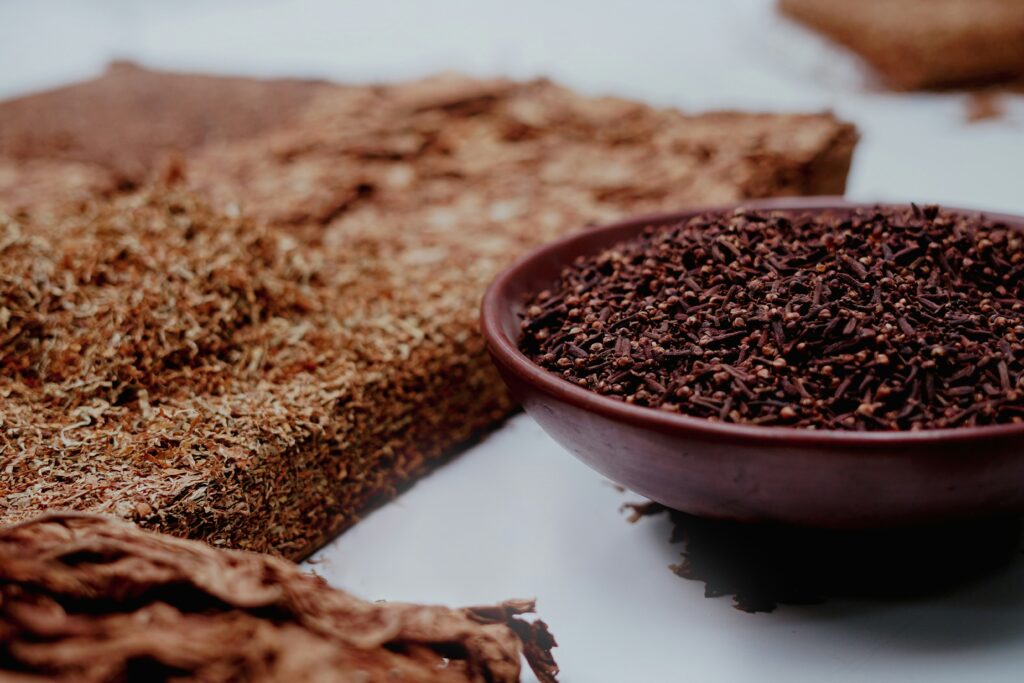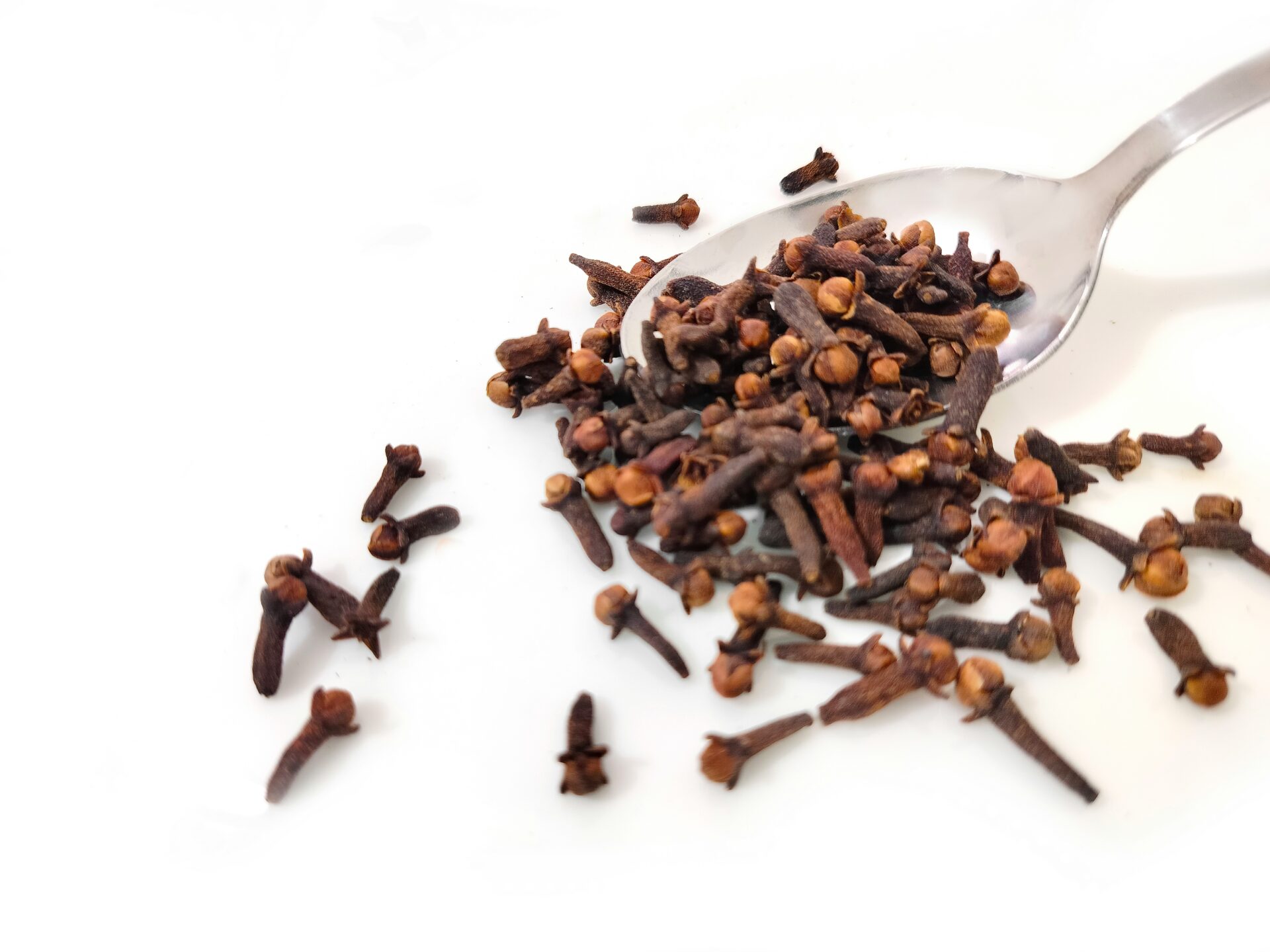Cloves are a fragrant and versatile spice with a rich history that spans thousands of years. Whether you’re adding a pinch to a savory dish or using them in a warm drink, cloves offer a unique depth that makes them a must-have in any kitchen. In this article, we’ll explore the origins, culinary uses, health benefits, and cultural significance of this powerful spice.
Cloves are a spice that add warmth and sweetness to foods like baked goods, sauces, meat rubs, marinades, and drinks. People also use the dried flower buds, leaves, stems, and oils from clove trees for healing.
Cloves are often used in traditional Chinese and Ayurvedic medicine for their health benefits. They come from an evergreen tree grown in East Africa and Southeast Asia.
This guide dives into the history, uses in food, medicinal benefits, and the cultural importance of cloves.
What Are Cloves
Cloves are a super fragrant spice that comes from the dried flower buds of the clove tree. Back in the day, spices were as valuable as gold, and cloves were right up there.
Cloves, which come from the dried buds of the Syzygium aromaticum tree, have been a go-to spice for centuries, not just in cooking but also in traditional medicine and even perfumes. Originally from Indonesia’s Maluku Islands, they’re now grown in tropical places all over the world like Zanzibar, Madagascar, and India.
Where Do Cloves Come From
The history of cloves goes back more than 2,000 years, where they were prized for both their flavor and medicinal uses. This fragrant spice was traded across the ancient Silk Road, making its way from the Maluku Islands to places like China, the Middle East, and Europe.
In China, as early as 200 BCE, cloves were used for more than just cooking—court officials would chew on them to freshen their breath before speaking to the emperor.
By the Middle Ages in Europe, cloves became one of the most sought-after spices, alongside nutmeg and black pepper. They were so rare and valuable that they were often worth as much as gold.
The high demand for cloves even sparked fierce competition during the age of European colonization. The Dutch and Portuguese fought for control over clove-producing islands during the 16th and 17th centuries, leading to the infamous Spice Wars, which eventually saw the Dutch take control of the Maluku Islands.
Growing and Harvesting
Cloves are grown primarily in tropical climates, with major producers being Indonesia, Madagascar, and Tanzania. The cloves are harvested by hand when the flower buds are still unopened, and they are dried in the sun to preserve their flavor and aroma.
The clove tree requires a lot of care and time to cultivate, as it takes up to six years before the tree starts producing flowers. However, once it matures, a clove tree can continue producing for over 50 years.
Culinary Uses

Cloves are the dried flower buds of the clove tree, and you can find them in spice shops, grocery stores, and health food stores year-round. Since they tend to lose their flavor quickly once ground, it’s a good idea to buy them whole and store them in an airtight container. When you need ground cloves, you can grind them fresh with a pepper mill or mortar and pestle right before using them.
Cloves are a versatile spice that can add a flavorful and healthy boost to your meals. Here are some tasty ways to use them:
- Mix ground cloves into pumpkin pie for extra warmth.
- Add a pinch of cloves to your chai latte for a spicy twist.
- Use whole cloves in a pickling spice mix for zesty pickles.
- Include cloves in curries for a rich, complex flavor.
- Sprinkle cloves into mulled wine for a festive touch.
- Create a spice rub with cloves to season meats.
Clove water is another popular use, where cloves are soaked to create a tea or infusion. However, there’s no solid evidence that drinking clove water offers health benefits, and since it’s unclear how much eugenol (the active compound) is in the mix, it’s best to be cautious about overconsumption.
Are Cloves Good For You?
Cloves contain eugenol, a compound with a strong aroma that might have anti-inflammatory and antibacterial effects. However, there isn’t enough solid scientific evidence to confirm its medicinal benefits. Consuming small amounts of cloves in food is generally safe.
Nutritional value of cloves: One teaspoon of ground cloves has:
- 6 calories
- 1.4g carbohydrates
- 13mg calcium
- 1.2mg manganese
- 5.4mg magnesium
- 21mg potassium
- 6mg sodium
- 3 micrograms vitamin K
Potential Health Benefits
- Dental health: Cloves may help with dental pain and gum disease, but more research is needed to compare it with standard treatments.
- Blood sugar: Some studies suggest cloves may lower blood sugar, but combining them with diabetes medication could be risky.
- Cancer protection: Clove compounds have shown cancer-fighting properties in lab studies, but these were at high concentrations, not safe for humans.
- Itchy skin relief: Clove oil may help soothe itchiness, but it can also cause irritation.
- Respiratory relief: Clove steam may help open nasal passages during colds, and chewing cloves might ease sore throats.
Risks and Side Effects
- Clove oil can be toxic, especially to children.
- Avoid clove products if pregnant, breastfeeding, taking blood thinners, or managing diabetes with insulin, as cloves may affect blood sugar and clotting.
Cooking With Cloves

When using whole cloves, add them during cooking but take them out before eating—they stay tough and woody. They’re great for flavoring dishes like baked ham, mulled cider, or wine.
Ground cloves, on the other hand, can be mixed directly into recipes or used in spice blends like garam masala, Chinese five-spice, and pumpkin pie spice.
Cloves are super versatile and can be used in meat rubs, marinades, baked goods, and sauces. They’re also perfect for warming drinks like chai, mulled wine, or cider, especially during the colder months. You’ll find them in everything from gingerbread and pumpkin pie to lamb korma and Vietnamese pho, and they’re often added to Indian rice dishes too.
The Power of Cloves
Cloves are a powerhouse spice with a rich history, versatile uses, and potential health benefits. Whether you’re cooking up a savory dish, baking seasonal treats, or exploring their medicinal properties, cloves add a unique depth and warmth. Their long-lasting significance in the kitchen and beyond makes them a must-have in any pantry.
Ready to explore more exciting flavors? Check out Incloodie Food Tour’s website and book a tour for a delicious journey through local cuisines!


1 Comment
What is Achiote? A Deep Dive into This Iconic Spice - Incloodie Food Tour
[…] Known for its deep red hue and earthy flavor, achiote has been a cornerstone of traditional food in Mexico, Central America, and parts of the Caribbean for centuries. From ancient rituals to modern-day tacos al pastor, this powerful spice has left a vibrant mark on culinary history. But what exactly is achiote, and why does it hold such a revered place among Mexican spices? […]